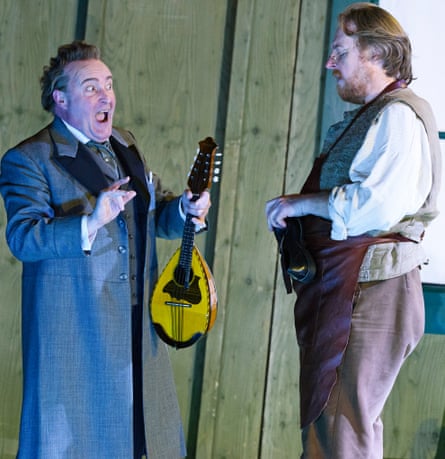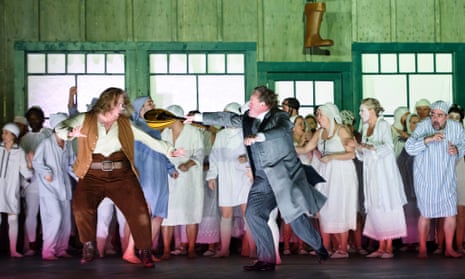Hans Sachs. Two little words which have caused me, and many esteemed colleagues before me, countless sleepless nights.
At over 5,000 words, the central character of Richard Wagner’s Die Meistersinger von Nürnberg is easily the longest role in opera, a vocal marathon that takes around two and a half hours to sing through in a practice room, which, on the night, equates to around three and a half hours on stage.
It’s a beast. Today is our first dress rehearsal, and the first time I sing through the whole role on stage with orchestra. Do I have the stamina, both mental and physical? Fingers crossed. There have been times over the last couple of months where our punishing six-days-a-week rehearsal schedule has reduced me to vocal and mental jelly, but, stubborn old goat that I am, I keep coming back for more.
The story of Meistersinger centres on a poetry contest in medieval Nuremberg. A young knight named Walther seeks to win the hand of Eva, whose father has determined that she may only marry the winner of the town’s annual poetry competition. This is run by the Guild of Mastersingers, a group of artisans who desire to better themselves through the appreciation of poetry and song. Walther’s audition to join the Guild is scuppered by his rival for Eva’s hand, the pedantic town-clerk Sixtus Beckmesser, but his wild poetic style is however appreciated by Hans Sachs, one of the town’s cobblers and a respected Mastersinger. Sachs takes Walther under his wing, and encourages him to adapt his novel poetic style to fit the Masters’ rules, thereby enabling him to win the contest and Eva’s hand in marriage.

In a coda to the evening’s proceedings, Hans Sachs declares that society should prize art above all other things, that we should seek to preserve it, and honour it always, for it is art that protects us from the vicissitudes of life. A noble sentiment, and one that pretty much anyone working in today’s financially strangled world of the arts would heartily echo.
However, Wagner, never a man for keeping things simple, chose to cloak this coda in a shroud of nationalism – it was his view that German art made Germans great, and should therefore never be diluted by foreign influence. Today, with the benefit of hindsight, such a sentiment can make people understandably uncomfortable.
In 1868, when the opera premiered, German unification was the prevailing European issue of the day. Under Bismarck, Germany would be bound as a single nation a mere three years later, and Wagner, never a political shrinking violet, was determined to have his say. That his nationalism would subsequently be appropriated to serve more sinister masters is something he himself could never have known.
Yet to focus on this nationalism, and how fascism would later usurp it, is to miss the point of Meistersinger. It’s a wonderful piece, full of sparkling vitality, and, at its heart, it is essentially about change and how we embrace it.
Across the world, opera is facing ever-increasing pressure to justify its existence. Money is tight, companies are facing administration and closure. As ever, in the face of financial hardship, it’s art that suffers.
All too often politicians treat art as a luxury rather than a necessity. Furthermore, they treat it as a museum piece, something to be preserved in a pickling jar, rather than as a living, breathing entity. Like Beckmesser, they cling to a set of rules and justifications that have very little relevance in the modern world. Others, meanwhile, call for wholesale change, a new broom to sweep away that which, to their eyes at least, is old, stale and irrelevant. For them, watchwords like transparency, availability, and inclusivity form the new artistic currency, and the breaking of all ties with the past is the only way forward. Where Beckmesser clings desperately to the old ways, these others, much like Walther, would happily abandon them without a moment’s thought.
Art possesses the ability to polarise opinion like almost nothing else in human experience, and, as such, opinion on how best to finance and run artistic institutions will always be likewise polarised. In Meistersinger, Sachs alone realises that both extremes ultimately lead to artistic ossification and death, and that art can only thrive by both honouring the old and embracing the new.
This production of Meistersinger could not come at a more opportune moment for the company. Owing to severe cuts to its Arts Council funding and recent high-profile changes to both board and management, English National Opera is in the headlines again.
Whatever choices our artistic leaders make in the future, I sincerely hope that they will heed Sachs’ advice. The survival of ENO may depend upon it. Above all, I trust that they will always seek to honour ENO’s true Masters, that wonderful army of passionate, talented people on the stage, in the pit, and behind the scenes who strive and sacrifice so diligently to produce great art, whatever the financial and political climate.
The Mastersingers of Nuremberg is at the Coliseum, London from 7 February to 10 March.
